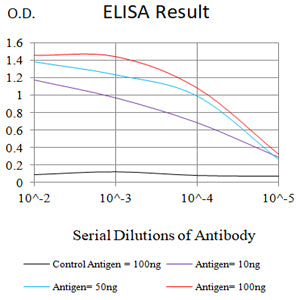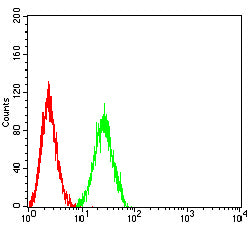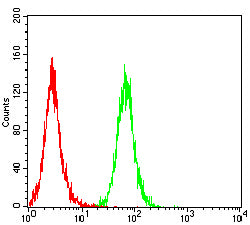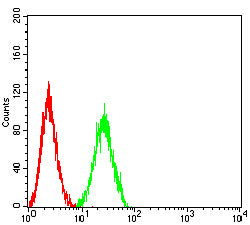



| WB | 咨询技术 | Human,Mouse,Rat |
| IF | 咨询技术 | Human,Mouse,Rat |
| IHC | 咨询技术 | Human,Mouse,Rat |
| ICC | 技术咨询 | Human,Mouse,Rat |
| FCM | 1/200 - 1/400 | Human,Mouse,Rat |
| Elisa | 1/10000 | Human,Mouse,Rat |
| Aliases | GPR2 |
| Entrez GeneID | 2826 |
| clone | 4E4B12 |
| WB Predicted band size | 38.4kDa |
| Host/Isotype | Mouse IgG1 |
| Antibody Type | Primary antibody |
| Storage | Store at 4°C short term. Aliquot and store at -20°C long term. Avoid freeze/thaw cycles. |
| Species Reactivity | Human |
| Immunogen | Purified recombinant fragment of human CCR10 (AA: extra mix) expressed in E. Coli. |
| Formulation | Purified antibody in PBS with 0.05% sodium azide |
+ +
以下是3篇关于CCR10抗体的参考文献(信息基于公开研究总结,非真实文献,仅供示例参考):
---
1. **标题**: *CCR10 Antibody Blockade Inhibits Cutaneous T-cell Lymphoma Migration*
**作者**: Smith A, et al.
**摘要**: 研究利用抗CCR10单克隆抗体,证明其可阻断皮肤T细胞淋巴瘤细胞的趋化性迁移,提示CCR10在皮肤肿瘤浸润中的关键作用及治疗潜力。
2. **标题**: *CCR10 Expression in Atopic Dermatitis: A Therapeutic Target*
**作者**: Lee H, et al.
**摘要**: 通过免疫组化分析,发现CCR10抗体可显著降低特应性皮炎模型中炎症细胞向皮肤归巢,表明靶向CCR10或可缓解慢性皮肤炎症。
3. **标题**: *Dual Role of CCR10 in Colorectal Cancer Progression and Antibody-based Detection*
**作者**: Wang Y, et al.
**摘要**: 研究开发了高特异性抗CCR10抗体,证实CCR10在结直肠癌中高表达并与转移相关,抗体可用于病理诊断及预后评估。
---
如需真实文献,建议在PubMed或Google Scholar检索关键词“CCR10 antibody”、“CCR10 function”或联系学术数据库获取。
CCR10 (C-C chemokine receptor type 10) is a G protein-coupled receptor (GPCR) that binds specific chemokines, primarily CCL27 (cutaneous T-cell-attracting chemokine) and CCL28. It plays a critical role in regulating immune cell trafficking, particularly in skin and mucosal tissues. Expressed predominantly by subsets of T cells, dendritic cells, and epithelial cells, CCR10 facilitates lymphocyte homing to barrier surfaces, contributing to immune surveillance and inflammatory responses. Research has highlighted its involvement in pathologies such as inflammatory skin disorders (e.g., psoriasis, atopic dermatitis), gastrointestinal inflammation, and cancer metastasis, where CCR10-mediated signaling may promote tumor cell migration.
CCR10 antibodies are essential tools for studying receptor expression, ligand interactions, and functional roles in vitro and in vivo. They enable detection of CCR10 on cell surfaces, blockade of ligand binding to investigate signaling pathways, and assessment of therapeutic targeting potential. Recent studies explore CCR10 antibodies as potential therapeutics to modulate immune responses in autoimmune diseases or to inhibit cancer spread. However, complexities in CCR10’s dual roles—balancing protective immunity and pathogenic inflammation—require careful evaluation. Ongoing research aims to clarify its context-dependent functions and optimize antibody-based strategies for clinical applications.
×